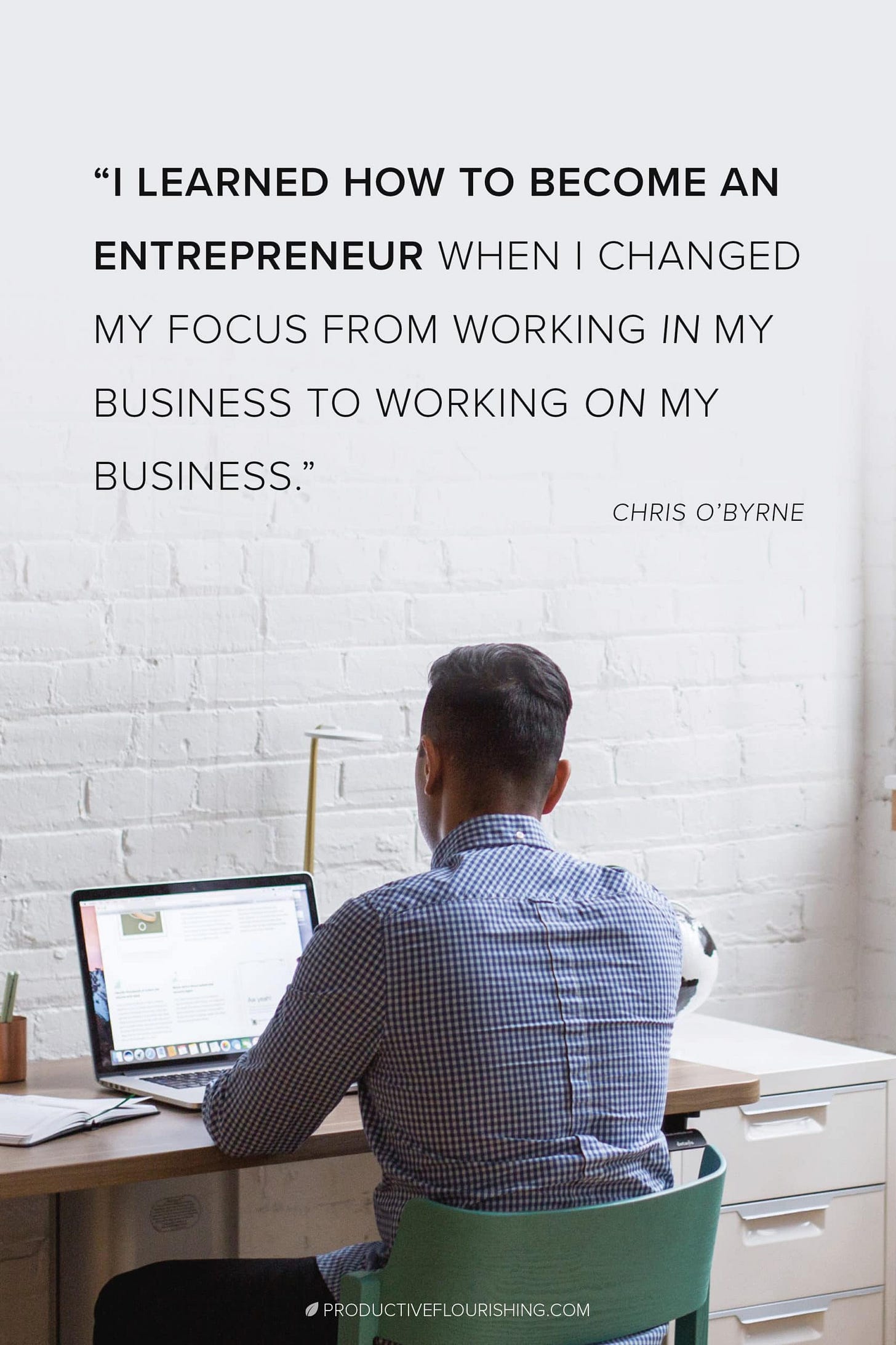How to Become an Entrepreneur When You Start as a Freelancer

Editor’s note: This is a guest post by Chris O’Byrne.
I officially started my “career” as a freelancer in 2009. I wanted to escape the 9-to-5, having worked as a chemical engineer and high school science teacher for several years. For a couple of years, I had tried to make a go of web design, affiliate marketing, and anything else I could think of, but in 2009, I attended a workshop on editing and became a freelance editor right then and there.
And it worked!
As a freelance editor, I made enough to get by on. One day, one of my clients asked if I could create an ebook for her. I said sure, and then quickly jumped on Google and figured out how to do that. I also taught myself how to make covers. Then someone asked me if I could design a print book for them, and once again, I hopped on Google and learned.
Now, I was earning a living as a freelance editor and as a freelance book designer. Business was good, but it soon became too much. I couldn’t keep up with the work. I did the math and realized that if I hired someone to handle the design for less than I was paid by the author, I could make money without doing much more than project management. Sweet!
Soon, I had a cover designer and a print book designer, while I handled the editing, ebook design, and project management myself. And somewhere along the way, I realized that I was building a business and wasn’t only a freelancer anymore. The problem was that I only knew how to send invoices and do the work; I didn’t know anything about building a business. Once again, I got on Google and started learning.
Becoming an Entrepreneur
Systems
The first resource I found was a book called The E-Myth Revisited that taught me how to create systems. I started creating and documenting systems, which helped both with training new contractors and with maintaining a certain level of quality. I kept improving the systems, which improved our quality and reliability, and the business continued to grow.
I continued to read books about how to build and run a business. All of that preparation and practice has led to today. I now have twelve people on my team, including three full-time project managers, several designers, and a marketing manager. Not only is my company growing, but it’s growing exponentially. I even hired a business coach last year, which propelled the business even faster.
Most of our systems are documented in Basecamp, the software we use to manage our projects. We created templates for each type of customer, and each template has a few hundred items in a checklist format along with text to explain certain steps. We use templates in our design as a starting point, and that is another form of system documentation. We also use templates for many of our email responses, which saves us a lot of time and keeps us from forgetting important information to share with our prospects and customers. We even have systems for training new team members.
Finances
While creating and documenting systems was the first and probably most important step to creating a real business and becoming an entrepreneur, I still had more to learn. The next step was to learn about finances.
For the first three years, I sent invoices via PayPal and didn’t keep track of my income or expenses. It was mostly just me doing the work, and because I was still thinking like a freelancer, it didn’t seem to matter. My first big step was to start using an accounting program so that I could track all of the money and also send professional invoices. The accounting software I chose, and still use, is Freshbooks.
I also wanted to learn more about small-business finances, so as I usually do, I found books that helped me. I read about accounting so I could understand which reports I needed to create and analyze. The Accounting Game is a simple yet easy-to-understand book that will get you up to speed on basic accounting principles. I also found a book called Small Business Finance for the Busy Entrepreneur. However, two of my favorite finance books are Simple Numbers, Straight Talk, Big Profits! and Profit First. Those two books alone will give you most of the financial education you need.
Marketing and Sales
Although I had a fairly decent background in marketing and sales because I used to be a sales engineer in the paper industry, I knew I still had a lot to learn. Although I have over 100 books related to marketing and sales, my favorite sales book is The Only Sales Guide You’ll Ever Need. That book really is the only one you’ll need for sales, although I’m sure you’ll pick up plenty of decent information from other sales books.
For marketing, two of the best books I’ve found are DotCom Secrets and Expert Secrets. Another book soon to be released by Steve Larsen is called Your Core Offer. Most people have no clue how to create offers, and Steve is an expert at this.
There are so many great marketing books that you’ll learn something useful from almost any of them, but the potential for information overload is huge, so I recommend you choose one or two people who have proven themselves and then limit yourself to learning from them.
Part of achieving success with marketing and sales is becoming adept at copywriting. Although you can hire great copywriters, it’s worth having a solid understanding of good copywriting so that you can apply the principles and techniques to many areas of your business, such as email copy, landing pages, etc. Two copywriting books I recommend are How to Write Copy That Sells and Copywriting Secrets.
Networking
For far too long, I avoided networking. I was a lone wolf, and I thought I could create a great business on the merits of my work alone. But once I started attending events and reaching out to people with only the intention of being helpful and useful, my business started to grow fast. A great book in this genre is Never Eat Alone. However, books alone won’t work here. You need to get out there and meet people. Social media is a good start, but don’t limit yourself to the online world. Get out there and meet people in person!
There are many great conferences and events, and there are more popping up all the time. Some of the big events are Social Media Marketing World, Funnel Hacking Live, and Traffic and Conversion Summit. But don’t limit yourself to the big conferences. My best connections and partnerships have been made by attending small “mastermind” events where there might be ten to thirty people.
And speaking of masterminds, look into joining a paid mastermind group. Most of these cost in the neighborhood of $500 per month, but they’re well worth it. There might be eight to ten people in your mastermind group, and they are usually led by someone who has already achieved the success you’re looking for. Not only do you get their personal attention, but you also have the opportunity to learn from and teach a small group of similarly minded people. These are powerful experiences, and you will probably develop life-long friendships.
Last, get a coach. I hired an expensive but excellent coach last year, and not-so-coincidentally, my business grew exponentially. Not only did I learn valuable information, but I also connected personally with a very successful entrepreneur. He, in turn, connected me with many other successful entrepreneurs, which then resulted in many new partnerships and business opportunities.
Shift Your Focus
As I learned in The E-Myth Revisited, I learned how to become an entrepreneur when I changed my focus from working in my business to working on my business. (Tweet this.)
This advice has become cliché, but it’s still true. I didn’t just stop working in my business; it was a process of slowly doing less as I hired more team members. Today, I spend most of my time creating partnerships and doing business development. I still read voraciously and never stop learning.
For me, the process involved learning about systems, finances, sales, and marketing, and then getting out there and meeting people I could help, even if it didn’t directly result in business. My focus was on the other person, not my own potential gain, and that is the key to successful networking and partnerships.
Now that you know about my path to success as an entrepreneur, what has helped you find success?



